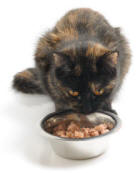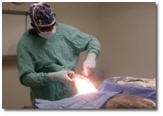Alternatives to surgery
At The Cat Practice, we avoid surgery at all cost. The exception is spay and neuter. We believe that this is an essential part of any pet’s health and wellbeing, and the only way to prevent unwanted litters; reduce the risk of some cancers; and avoid unsociable behaviors such as spraying, marking and aggression.
In most other cases, surgery is not the only alternative. Surgery for your cat can be costly, requires additional recovery time and is not without risks. Today there are a number of alternative options to surgical intervention, including:
-
Physical rehabilitation
-
Treatment with medication
-
Treatment with special diet/supplements

Many conditions can be treated with special diet and supplements.
If surgery is necessary

Veterinary orthopedic surgeon Dr. Gumbs performing surgery.
In some cases, surgery may be the only option. If your cat has a lump or mass, an obstruction or a severe bone fracture, surgery is often the only treatment. In such cases, QUICK ACTION is required to correct potentially fatal situations, such as:
-
Mass biopsies and removals
-
Bladder stones
-
Urinary obstructions
-
Foreign bodies that have been swallowed
-
Severe fractures (surgery performed by veterinary orthopedic surgeon Dr. John Gumbs)
If your cat requires surgery, it will be performed in our state-of-the-art surgical suite where we take every precaution to reduce risk and make your pet as comfortable as possible. This includes:
-
Recommended recent physical exam
-
Recommended pre-anesthetic blood panel and urinalysis
-
Possible echocardiogram* (for cats with a heart murmur or for older cats; all echocardiograms are performed by veterinary cardiologist Dr. William Brown)
-
Use of safe inhalant gas anesthesia
-
Insertion of IV catheter to administer fluids
-
Continuous monitoring of vital signs: heart rate, blood pressure, oxygen flow and body temperature
-
Pain management
*An echocardiogram is a cardiac ultrasound that helps your veterinarian identify possible heart disease and the origins of any heart murmurs that may be heard during a physical exam. An echocardiogram should be considered as a precaution for ALL cats that will be undergoing any type of surgery. It’s especially important for cats that are at increased risk of heart disease. (See which breeds are prone to heart disease). An echocardiogram is also the ONLY way of determining the underlying cause of a heart murmur in cats. See more about Heart Disease under “Chronic Condition care / Heart Disease.


